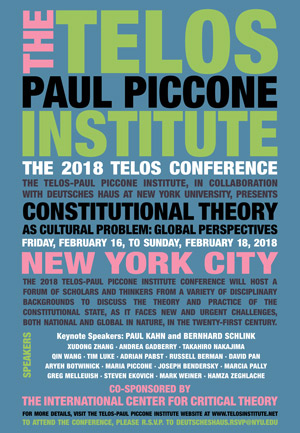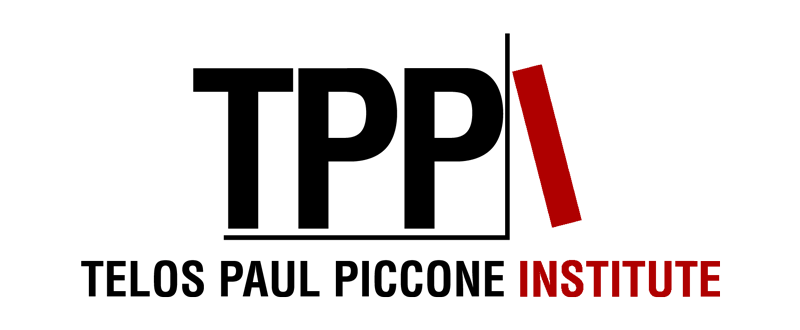The 2018 Telos-Paul Piccone Institute Conference
February 16–18, 2018
New York, NY
The Telos-Paul Piccone Institute, in collaboration with
Deutsches Haus at New York University, presents
Constitutional Theory as Cultural Problem:
Global Perspectives
Organized by Xudong Zhang (International Center for Critical Theory and New York University) and David Pan (Telos-Paul Piccone Institute and the University of California, Irvine)
Keynote Speakers: Paul Kahn and Bernhard Schlink
View the conference program (PDF)
Conference videos
Conference Description
The International Center for Critical Theory and the Telos-Paul Piccone Institute will jointly host a conference entitled "Constitutional Theory as Cultural Problem: Global Perspectives," to be held at New York University, New York, from February 16–18, 2018.
 The challenges faced by the liberal democratic model in the 21st century have made constitutional theory into an urgent topic of global concern. Both the second Iraq War and the revolutions of the Arab Spring frustrated hopes of an easy trajectory toward liberal democratic constitutional orders. If there was the hope that liberation would mean the establishment of liberal democracy, the result has been that emancipation from tyranny does not naturally lead in a particular political direction. Such a conclusion presents fundamental problems for a constitutional theory that is built around a liberal democratic model.
The challenges faced by the liberal democratic model in the 21st century have made constitutional theory into an urgent topic of global concern. Both the second Iraq War and the revolutions of the Arab Spring frustrated hopes of an easy trajectory toward liberal democratic constitutional orders. If there was the hope that liberation would mean the establishment of liberal democracy, the result has been that emancipation from tyranny does not naturally lead in a particular political direction. Such a conclusion presents fundamental problems for a constitutional theory that is built around a liberal democratic model.
These questions indicate that the constitutional state, as theory and practice in modern Europe, North America, and Japan, while continuing to be the common point of reference, calls for renewed reflections as it faces new challenges both domestic/national and global in nature. The shift of economic and productive centers of gravity from the West to other parts of the world comes not only with a whole range of issues regarding geopolitics, international relations, and security, but also with a new sense of urgency to study different state forms, forms of sovereignty, notions of democracy and freedom, and political legitimacy as they are rooted in and informed by long-standing social and cultural norms. An understanding of these social and cultural norms not as remnants of what has been rendered obsolete and backward by modernity and postmodernity, but as vital processes that foster new ideas and drive change, requires concerted efforts at reading them—as texts, as theory, and as practice—both sympathetically and critically. By placing them under the sharp focus of constitutional theory and theories of sovereignty, we seek to promote a sustained dialogue between scholars and thinkers from both the West and the non-Western world in an area defined by the intersection between critical theory and political philosophy.
Such analysis requires an interdisciplinary approach, in which not just legal and political questions, but also rhetorical issues of political representation and legitimacy are recognized as essential to the problem. If a constitution presents a people's self-understanding of its political identity, this identity is not a naturally occurring structure, but the result of literary, cultural, and theological processes that follow a representational logic. Recent failed attempts at constitution building, for instance in Libya and Egypt, have shown that the interaction between law and representation is perhaps the key consideration in determining the success and failure of a particular constitutional structure. This project will thus include scholars in diverse fields, such as law, political science, literature, and philosophy.
This new look at both constitutional theory and the way in which constitutions relate to notions of popular sovereignty and political representation is in one sense a response to revolutions in North Africa and the Middle East as well as experimentation with new forms of political order in the Europe Union and the former Soviet bloc. The faltering stability of the European Union as a political order, for instance, indicates that its constitutional arrangements are perhaps inadequate to its situation. What are the alternatives, and how do these alternatives relate to popular conceptions of what Europe means? Other areas such as China, Cuba, and North Korea, though presently stable, would also benefit from an analysis of constitutional theory that could provide avenues for reform while avoiding the dangers of revolutionary change. Does the recent restriction of liberal freedoms in China indicate a growing crisis, leading to a need to imagine new constitutional arrangements for China? Or can the increasing authoritarianism establish itself as itself the basis of a new stable order? Finally, places like the United States, Japan, and India, with relatively stable democracies, also face questions about the relation between their forms of order and the dynamics of political representation that endanger their stability. The successes of Modi in India and Trump in the United States challenge the liberal foundations of these democracies and are forcing a reconsideration of the customs and rituals of electoral politics. All of these developments warrant a re-evaluation of the basic tenets of political and constitutional theory as well as an attempt to think through constitutional issues in regional and historical contexts that could benefit from a more thoroughgoing analysis of their situation.
If one goal is to think about what went wrong with the theory, the other one is to reflect on what to do now. One of the primary explanations of the disappointing directions of transformations in North Africa and the Middle East has been that the prerequisites for a liberal democratic order were missing. The conclusion here could be that the political goal should be to try and establish these prerequisites, such as the rule of law, education, economic development, and free elections. But another line of thinking might inquire into the practical alternatives when these prerequisites are missing. If a constitution embodies a people's self-conception of itself as a political entity, can there be alternative constitutional arrangements that match different self-conceptions? On the one hand, this is a question about the way liberal democratic constitutions function in different contexts. Does politics in Japan or India follow different constitutional dynamics than politics in the United States, for instance, in spite of shared formal structures? On the other hand, it is a question about what to do in a situation, such as Egypt, in which a liberal democratic constitution could not be established. In the case of Egypt, there is a functioning order that indicates that its people are "constituted" as a people, but it is not clear what the nature and structure of this constitution might be. Does Egypt in fact have the order that suits the present situation? If not, what are the practical alternatives?
Conference Videos
Keynote Presentation by Bernhard Schlink:
Minimal Constitutionalism
Moderated by David Pan
Keynote Presentation by Paul Kahn:
A Constitutional Culture: Between Law and Power
Moderated by Russell A. Berman
Session on "Tradition and State Structure"
With Xudong Zhang, John Yu Zou, Andrea Gadberry, and Greg Melleuish
Moderated by Marcia Pally
Session on "U.S. Political Movements"
With Tim Luke, Mark Weiner, David Pan, and Russell Berman
Moderated by Joseph Bendersky
Session on "Japanese Constitutionalism in World-Historical Context"
With Takahiro Nakajima, Qin Wang, and Loren Goodman
Moderated by Xudong Zhang
Session on "Cultural Foundations of Political Life"
With Marcia Pally, Adrian Pabst, Joseph Bendersky, and Aryeh Botwinick
Moderated by David Pan
